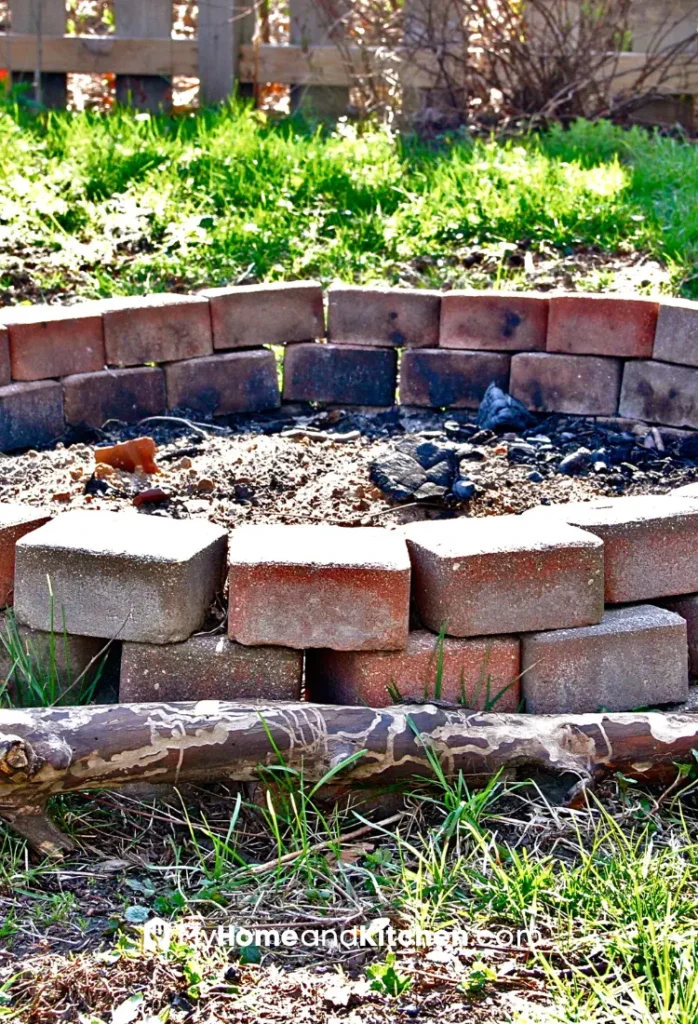Join Our Newsletter for Cozy Home Inspiration, Family Fun, and Delicious Recipes Every Week
Can you use engineering bricks for a fire pit?
I am always looking for new ways to entertain myself and my family. My husband and I love spending time outside together. Our favorite thing to do is sit around the fire pit at night drink hot chocolate and roast marshmallows.
What are engineering bricks? Engineering bricks are building blocks used for construction and can withstand high pressure or weights.
Can you use river rocks safely in your fire pit?
Can you use engineering bricks for a fire pit?

Are engineering bricks OK for a fire pit? – yes they are because of their thermal properties.
Will any bricks work for a fire pit? – most will work, but moist bricks may be prone to cracking – so no not any brick, use a good fireproof brick. There are many brink choices so it is best to use a special brick for a firepit.
Are engineering bricks fireproof?
To a degree, bricks do not burn so they are fireproof. The key question however do they have thermal resistance and do they fracture or crack
If your brick has cracks in it then it will be very difficult to keep them from slowly breaking down further.
Engineering bricks are fireproof, they are baked in a kiln and have good resistance to fire. One of the downsides is they can crack, however.
Are engineering bricks OK for a fire pit?
Yes, engineering bricks are acceptable for a firepit, or even the base of a firepit. They are available in many sizes, shapes, and colors. Just make sure that if you choose to build with them you get ones that are made specifically for outdoor use.
Do you need special bricks for a fire pit?
If you just buy any old bricks off the shelf they may break when exposed to heat. You should look for bricks that are engineered for outdoor use. Will any bricks work for a fire pit? – No get ones that are built to be fire-resistant and weatherproof.
Are engineering bricks porous?
Engineering bricks are not porous, they are certainly less porous than normal bricks. In addition, they are stronger. Especially Engineering Bricks that are Class A. These higher-specified bricks are often blue. They are also baked at higher temperatures.
This leads to the question – are engineering bricks waterproof?
These bricks are not porous at all and are resistant to water and largely waterproof.
Are engineering bricks frost-resistant?
Engineering bricks are reasonably frost-resistant because they are manufactured as non-porous.
Are engineering bricks harder to point when making a firepit?
Engineering bricks are not harder to point than normal bricks. Many people will stack them or lay them on the base with some sand.
How to clean a brick fire pit?
Are engineering bricks clay?
Engineering bricks are made of clay – just like other regular bricks or the facing variety. They will contain salts that are soluble in an alkaline fluid. So don’t clean your brick firepit with a caustic solution.
What can you use instead of engineering firebrick when building a firepit?
You can use concrete blocks, cinderblocks, or even refractory concrete (retains heat well). If you want something that looks more natural, you could try using river rocks.
Engineering bricks come in two main classes [class A; class b]. They both will have good strength when under pressure or compressed. When it comes to building a brick firepit they also have minimal water absorption.
Can you paint engineering bricks with fireproof paint when building a firepit?
Yes, you can use fireproof paint to paint engineering bricks. Fireproof paint has been used for decades to protect buildings from fires. The paint contains a mixture of zinc oxide and titanium dioxide, which makes it highly resistant to heat. However, the paint must be applied to the brick surface using a spray gun.
Can you render engineering bricks when building a firepit?
Yes! You can use concrete blocks to create a fire pit. To do this, prepare the top and surface of each block. Then, render on the outside concrete. Once the concrete has hardened, you can paint the surface black with fireproof paint.
What is the difference between engineered fire bricks and normal bricks?
Fire bricks are made from clay mixed with sand and other materials that make them heat resistant. They are used for building homes and walls, and they are also used for making pots and vases. Normal bricks are usually made from clay alone, which means they are less durable and tend to crack easily.
What temperature can engineering bricks withstand?
If the temperature is too hot, then the bricks will degrade. Bricks can be made from various materials, such as concrete, clay, sand, and stone. The best material for making bricks is clay because it has a high compressive strength, which means that it can support heavy loads. Clay bricks can also be fired at temperatures up to 900 degrees Fahrenheit, which makes them ideal for use in kilns.
Engineering bricks disadvantages
The disadvantage of using bricks is that they break easily, especially when used for construction purposes. They also require much maintenance and care.
- construction is time-consuming
- mold can grow on the brick surface
- the surface is not easy to clean
ava Rocks are also an alternative to Engineered bricks.
Why do engineering bricks have holes in them?
– To allow air circulation so they don’t get too hot – in some circumstances this is advantageous.
– The holes help keep the mortar from sticking to the brick as it will enter and create a stronger more integrated bond.
– They will weigh less!
The conclusion is that engineered bricks are a good option to consider when building a firepit.
You can even integrate a pizza oven into your firepit which makes cooking even more fun.
FAQ
Can I use regular bricks for a fire pit?
Regular bricks may break when it’s hot, so it’s better to pick bricks made for outdoors.
How big should my fire pit be with engineering bricks?
Choose bricks that fit the size you want for your fire pit.
How do I clean my fire pit made with engineering bricks?
Use a soft brush or cloth to clean the bricks. Don’t use strong cleaning liquids.
Can I mix different bricks for my fire pit?
It’s okay for looks, but it’s better to use the same kind of fire-resistant bricks.
Is my fire pit safe with engineering bricks?
Keep the area ventilated, follow safety rules, and be careful with hot surfaces.
Can I use these bricks for an indoor fireplace?
Check the rules and codes first, but it might work indoors too.
What else can I use for a fire pit instead of engineering bricks?
Use concrete blocks, cinderblocks, or special concrete. Rocks work too if they can handle the heat.
Can I cook on my fire pit with engineering bricks?
Yes, you can add a grill for cooking on your fire pit.
Can I put my fire pit on a wooden deck with these bricks?
Be careful. Put something heat-resistant under the fire pit and follow safety rules to avoid deck damage.
How long will my fire pit with these bricks last?
It depends on how you use and care for it. Check it often to make it last longer.
Conclusion
Using engineering bricks for your fire pit is a solid choice. They handle heat well, making your outdoor space warm and inviting. Whether you’re going for a simple setup or adding a grill for cooking, these bricks are versatile and safe.
Remember, keep safety in mind, follow local rules, and clean your fire pit with care. With the right design and a bit of creativity, you’ll have a perfect spot for family gatherings or quiet nights under the stars. So, go ahead, light that fire, and enjoy the warmth and memories in your backyard.





